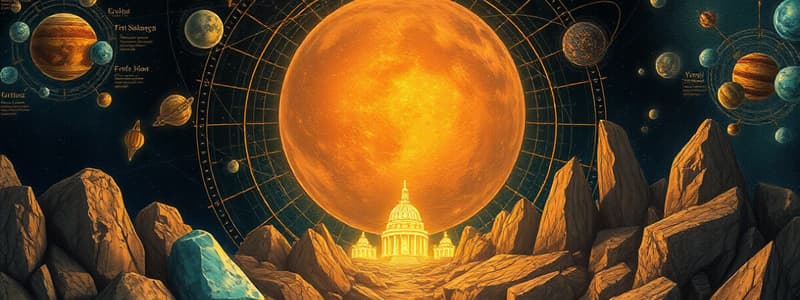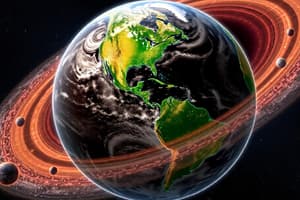Podcast
Questions and Answers
Which branch of Earth science primarily studies the processes that shape the Earth's interior?
Which branch of Earth science primarily studies the processes that shape the Earth's interior?
- Meteorology
- Astronomy
- Geology (correct)
- Oceanography
What does the Vortex Theory propose about the formation of the solar system?
What does the Vortex Theory propose about the formation of the solar system?
- Remaining gas and dust collapsed to create all celestial bodies.
- The solar system developed from swirling pre-solar materials. (correct)
- Planets were created in a cloud of gas due to gravitational pull.
- Planets formed by the collision of the sun with a giant comet.
Which of the following best defines the Lithosphere?
Which of the following best defines the Lithosphere?
- The liquid water portion of Earth.
- The atmosphere surrounding the Earth.
- The gaseous layer beyond the Earth's crust.
- The solid surface and interior of the Earth. (correct)
Which theory suggests that planets were formed from substances torn out of the sun?
Which theory suggests that planets were formed from substances torn out of the sun?
What aspect of weather does Meteorology primarily study?
What aspect of weather does Meteorology primarily study?
What is the primary focus of Oceanography as a branch of Earth science?
What is the primary focus of Oceanography as a branch of Earth science?
Which of the following is NOT a proposed theory about the formation of the solar system?
Which of the following is NOT a proposed theory about the formation of the solar system?
In which sphere would you categorize the solidification of water found on Earth's surface?
In which sphere would you categorize the solidification of water found on Earth's surface?
What primary gases compose the atmosphere surrounding Earth?
What primary gases compose the atmosphere surrounding Earth?
Which property of a mineral is assessed by Moh's scale?
Which property of a mineral is assessed by Moh's scale?
Which type of igneous rock crystallizes from lava at the Earth's surface?
Which type of igneous rock crystallizes from lava at the Earth's surface?
Which characteristic describes the tendency of a mineral to break along flat, even surfaces?
Which characteristic describes the tendency of a mineral to break along flat, even surfaces?
What role does the atmosphere play in making Earth livable?
What role does the atmosphere play in making Earth livable?
Which of the following describes a property of minerals that may indicate their identity?
Which of the following describes a property of minerals that may indicate their identity?
Which of the following is NOT a characteristic feature of igneous rocks?
Which of the following is NOT a characteristic feature of igneous rocks?
Which mineral property might indicate if it can be attracted to a magnet?
Which mineral property might indicate if it can be attracted to a magnet?
What type of metamorphism occurs when hot igneous rock intrudes into pre-existing rock?
What type of metamorphism occurs when hot igneous rock intrudes into pre-existing rock?
Which process causes rocks to break apart without changing their chemical composition?
Which process causes rocks to break apart without changing their chemical composition?
What happens during frost wedging?
What happens during frost wedging?
What is the mechanical wearing of rocks by friction and impact known as?
What is the mechanical wearing of rocks by friction and impact known as?
How does thermal expansion and contraction affect rocks?
How does thermal expansion and contraction affect rocks?
Which action of plants contributes to biological weathering?
Which action of plants contributes to biological weathering?
What is an example of pressure-release fracturing?
What is an example of pressure-release fracturing?
What role does abrasion play in the weathering process?
What role does abrasion play in the weathering process?
Which of the following processes involves the reaction of rock minerals with oxygen?
Which of the following processes involves the reaction of rock minerals with oxygen?
What characterizes contact metamorphism?
What characterizes contact metamorphism?
What is the primary reason why metamorphism is important?
What is the primary reason why metamorphism is important?
Which agent is primarily responsible for driving the metamorphic reactions?
Which agent is primarily responsible for driving the metamorphic reactions?
What process occurs when water reacts with a mineral to form a new mineral?
What process occurs when water reacts with a mineral to form a new mineral?
Which mineral is primarily used in the manufacture of glass and various electronics?
Which mineral is primarily used in the manufacture of glass and various electronics?
Which metamorphic process results in the reorientation of mineral grains into a layered or banded appearance?
Which metamorphic process results in the reorientation of mineral grains into a layered or banded appearance?
What effect does hydrolysis typically have on feldspar?
What effect does hydrolysis typically have on feldspar?
What is the primary function of a turbine in hydroelectric power generation?
What is the primary function of a turbine in hydroelectric power generation?
Which type of hydroelectric power facility uses a dam to store river water?
Which type of hydroelectric power facility uses a dam to store river water?
What process do pumped storage hydropower facilities use to store energy?
What process do pumped storage hydropower facilities use to store energy?
Which property of water is primarily responsible for allowing it to flow upward against gravity?
Which property of water is primarily responsible for allowing it to flow upward against gravity?
Which of the following describe surface water?
Which of the following describe surface water?
What type of energy conversion occurs in a generator of a hydroelectric power plant?
What type of energy conversion occurs in a generator of a hydroelectric power plant?
Which of these properties of water affects its temperature tolerance?
Which of these properties of water affects its temperature tolerance?
What is the primary characteristic of a run-of-river hydroelectric facility?
What is the primary characteristic of a run-of-river hydroelectric facility?
Flashcards are hidden until you start studying
Study Notes
Branches of Earth Science
- Geology: Studies Earth's origin, history, structure, and processes shaping its surface.
- Meteorology: Examines atmospheric phenomena including weather patterns and severe weather events like hurricanes and tornadoes.
- Astronomy: Investigates outer space and celestial bodies beyond Earth.
- Oceanography: Explores all aspects of the ocean, covering about 70% of Earth's surface.
Theories About Origin of the Solar System
- Solar Nebular Hypothesis: Proposes solar system formation from a collapsing interstellar gas and dust cloud.
- Vortex Theory: Suggests whirlpool motion in pre-solar materials formed solar bodies with circular orbits (Rene Descartes).
- Collision Theory: Claims planets formed from a collision between the sun and a giant comet (George-Louis Leclerc).
- Kant-Laplace Theory: Introduces the idea of a gas and dust cloud collapsing under gravity, spinning and flattening (Immanuel Kant, Pierre Simon Laplace).
- Jeans-Jeffreys’ Tidal Theory: Suggests planets originated from material torn from the sun (Harold Jeffreys, James Jeans).
Earth’s Spheres
- Lithosphere: Earth's solid surface, including rocks, minerals, and landforms.
- Hydrosphere: All liquid water on Earth, vital for life and ecosystem regulation; includes Cryosphere (solidified water).
- Atmosphere: Gaseous layer encasing Earth, primarily composed of nitrogen, oxygen, carbon dioxide, and water vapor, essential for supporting life.
- Biosphere: Encompasses all living organisms, including humans, and their organic remains.
Physical and Chemical Properties of Minerals
- Luster: Describes light reflection on a mineral's surface.
- Hardness: Measured using Moh’s scale, ranging from 1 (softest) to 10 (hardest).
- Crystalline Structure: Indicates internal atomic arrangement in the mineral.
- Cleavage/Fracture: Cleavage refers to smooth breakage; fracture is uneven breakage.
- Magnetism: Some minerals can be magnetized.
- Reaction to Acid: Carbonates visibly react with acid.
- Specific Gravity: Mineral weight compared to an equal volume of water.
Rocks (Types and Examples)
- Igneous Rocks: Formed from crystallization of magma or lava; examples include granite, basalt, and obsidian.
- Classified as intrusive (formed underground) or extrusive (formed at the surface).
- Metamorphic Rocks: Altered through heat and pressure; changes include mineral composition and texture.
Physical, Biological, and Chemical Weathering
- Physical Weathering: Breaks rocks without altering their composition (e.g., frost wedging, abrasion).
- Biological Weathering: Involves organisms causing mechanical breakdown (e.g., root growth).
- Chemical Weathering: Alters chemical composition (e.g., dissolution, hydrolysis, oxidation).
Metamorphism
- Definition: Transformation of existing rocks through mineral content and texture changes without complete melting.
- Contact Metamorphism: Occurs due to heat from nearby molten rock.
- Regional Metamorphism: Involves large-scale heat and pressure affecting extensive areas.
- Agents of Metamorphism: Include heat, pressure, and chemically active fluids.
Metallic Ores and Industrial Minerals of the Philippines
- Quartz: Used in glass manufacturing and as an abrasive; crucial for electronic devices and optical components.
Energy Resources: Geothermal and Hydrothermal
- Geothermal Energy: Utilizes steam to spin turbines for electricity generation, recycling cooled water back into the Earth.
- Hydrothermal Energy: Harnesses moving water for generating electrical energy through turbines and generators.
Water Resources and Properties
- Surface Water: Includes oceans, rivers, and lakes; crucial for ecosystems.
- Underground Water: Stored in aquifers; essential for drinking water.
- Key Properties of Water: Polarity, capillary action, surface tension, density, and high specific heat.
Soil Resources
- Soil Composition: Inorganic particles and organic matter; essential for plant growth and agriculture.
Studying That Suits You
Use AI to generate personalized quizzes and flashcards to suit your learning preferences.



